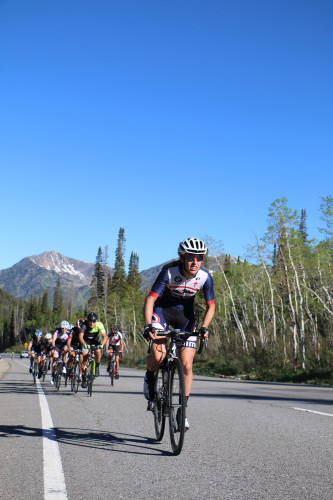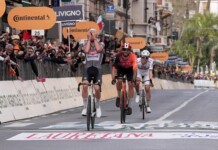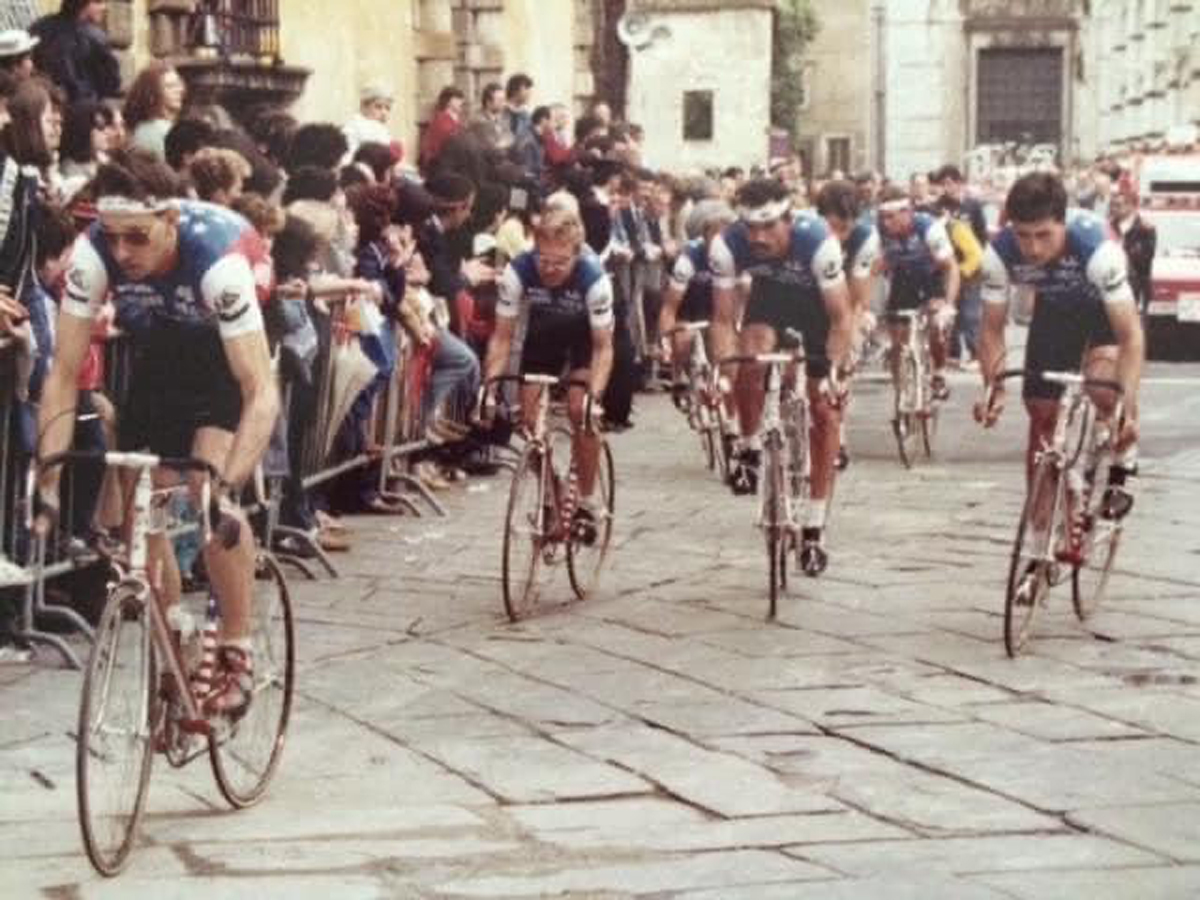Mindy McCutcheon has been a Western States golden girl for multiple seasons, and takes a well earned spot on Utah’s UCI pro women’s team – Visit Dallas DNA Pro Cycling. We had the opportunity to pose her questions we figured many of you would have for this likeable athlete and feared competitor.
This year, you have won races in cyclocross, MTB and road. How does the ‘cross discipline contribute to your success?
I love each discipline for different reasons, and I love the challenge that each discipline presents. They’re so totally different from each other, but the crossover between them helps make me stronger across the board.

For instance, I wouldn’t be nearly as comfortable in cyclocross if I didn’t practice my handling skills on the mountain bike. Or I wouldn’t be nearly as strong of a climber on the trails if I didn’t slog for miles up canyons on my road bike. My biggest peeve is not having enough time to ride all my bikes as much as I’d like!
You have been with Canyon Bicycles Racing Team for a long time. What are your feelings on leaving that team and riding for a new one on a larger competitive stage?
I owe a huge amount of my success to Mike Pratt and Sara Baker at Canyon Bicycles. I met Sara when we were both cat 4’s and she invited me along on their Sunday group rides. That became my bike family, and she became one of my best friends.
Mike and the crew at the shop have been amazing to work with, and they’ve always had my back. I can’t thank them enough! Everyone has been super supportive in seeing me take this to the next level and helping me to grow as a racer. I wouldn’t be where I am today without their support since day one, period. I’m definitely sad to be leaving Canyon, but they’re still my pals and will always have a special place in my heart!
How did you first get involved in bike racing?
My history with bikes goes back a while. I always had bikes as a kid, but it wasn’t until I was heading to college in the U.P. (Upper Peninsula… that often forgotten part of Michigan near Canada) that I decided I wanted a REAL bike for all the great mountain bike trails I had heard about (seriously, they’re awesome). So, I bought myself a Specialized Rock Hopper with money I had earned working at Dairy Queen throughout high school.
I started mountain bike racing a bit around 2006 and had a blast. I dabbled in it around the Midwest and did okay locally, but didn’t take it super seriously.
In late 2008, I moved to Utah. I remember thinking “There are so many amazing athletes in Utah, I’ll never be at the top level.” I rode a bit, but was still running marathons, so again, I didn’t take it seriously. In 2011, I decided to test my skills on the road at the Bear Lake Classic. I had no idea what I was doing! However, it was that fateful day, I met my dear friend Cathy Kim. She was great out there; pointing out who was who, what to do, and whose wheel to avoid. I had a blast, but disappeared until mid-season 2012. That’s when I decided, I wanted to upgrade to Cat 3 and learn more. By the end of 2012, I had earned my upgrade and met Sara. That’s when I got connected with Canyon and the rest is pretty much history.
Any advice to other women who want to start racing?
I was so fortunate to have met some great ladies early in my cycling adventures. It is so intimidating showing up to a race, not knowing anyone and having no clue what to do. I’m pretty sure when I first started road riding in Utah, I still thought you wore underwear with your chamois [insert pad in cycling shorts]. Luckily I figured stuff like that out pretty quickly. But this sport is crazy.
I think what helped me the most was hitting group rides and being attentive. As a new rider or racer, it’s not enough to just hop on your bike and ride. You need to watch what’s going on around you, ask questions, and process everything. If you’re in a good group, the other folks will give you good tips, like how to draft, what side to be on depending on the wind, how to attack and counter, or how to spit without spitting on everyone behind you. There also are clinics put on by various folks like Plan7, where you can learn all sorts of awesome skills.
Some feel that this recruitment and move to the DNA women’s program is long overdue; any thoughts you can share about that?
Oh boy, is it ever! I’ve long wanted to step up to the next level of racing, but faced obstacles in my personal life that held me back. It got to the point about a year ago where I had to do some serious reflecting and determine what would make me happy and fulfilled. I knew I ultimately had to see how far I could take this or I would have huge regrets down the road. Some people think bike racing (or any professional sport) is selfish. Well it is. You spend hours upon hours training, cross training, eating well, not going out with your friends, trying to sleep as much as possible, and doing a lot of laundry.
For me, making the decision to hit the national circuit this year, (which lead to getting picked up by Visit Dallas DNA Pro Cycling) was never about choosing bike racing over something or someone. My decision centered around choosing to take care of myself. This led to some tough decision making, but I’m confident in the choices I’ve made. Sure, now I have the opportunity to be part of an amazing team and fulfill my personal goals, but I also have a new found level of confidence that carries over into racing — and the rest of my daily life. I’m in the best place mentally and physically I’ve ever been, so there’s really no better time to chase my goals.
For athletes who may be reading, who are interested in excelling in multiple sports, not just cycling, what insights have proven most helpful to you in your athletic and crosstraining endeavors?
Before I was ever a cyclist, I was a collegiate runner and alpine ski racer. I ski raced from 5th grade through my undergrad years at Northern Michigan University, and I ran track from 6th grade until 2010, when I suffered stress fractures in L3 and L5. I loved both of these sports, but was always just mediocre. If it weren’t for injuries suffered in these sports, I may never have started cycling so much to begin with. Recovering from injury made me focus on cross training like yoga, Pilates, and strength training. This has all played into my becoming a stronger athlete on the bike than I ever was as a runner or ski racer.
Riding a bike is actually only a small portion (ok, that’s not true, it’s a big portion…) of bike racing. What people don’t realize is how much other stuff you have to do to be a strong, injury free athlete. Each week, in addition to my on-the-bike training, I do strength and plyos, yoga, and core. During my cyclocross season I try to run once a week and during the winter I Alpine and Nordic ski.
For me, yoga has been one of the hardest things to dedicate myself to — mentally and physically. I try to hit several different classes (yin, power, and restorative) each week. Each class offers something totally different, but they all allow you to focus on being present and facing the shit in your life. It’s the closest thing to meditation or religion that I practice. The challenge of yoga is so different than being on the bike, but I really think the mental clarity you get from it (or whatever your “yoga” is) is just as powerful as the training you put into your primary sport.
What advice would you give specifically to female endurance athletes, and are there age-specific insights you feel important to share with any particular demographic or age group?
One of the greatest things I’ve noticed over the past couple of years is the ability to connect to other women through social media. It has allowed groups of women of all ages and ability levels to share in adventures. Having these little meet-ups has helped me grow friendships in my life and has helped provide opportunities to meet other gals I may not have met otherwise.
As for female endurance athletes, no matter the age, I think it’s so crucial to have realistic expectations and patience. If you’re just starting out, it’s easy to be super motivated and want to do it all. However, that can lead to burn-out or injury. Aside from the potential negatives to being an endurance athlete, probably the greatest thing is: age doesn’t matter! I ride with friends who are 20 years older and have friends who are 15 years younger. That’s the beauty of these sports — your training partners don’t have to fit some cookie-cutter mould. I’ve learned so much in the hundreds of hours I’ve spent riding alongside my older, wiser friends. These moments are sometimes more gratifying than any race because you get to really connect with a person while doing the things you love.
Finally, are there aspects of the cycling and broader endurance sports community in Utah and beyond that you would like to see evolve in any particular way?
I feel there’s a bit of ebb and flow with the cycling community in Utah. When I first started racing, the numbers in the women’s categories were much larger. For whatever reason (injuries, retirement, life!), they seem to have dipped a bit lately. Sometimes I see long, wordy threads on Facebook with speculation as to why this is happening. It’s easy for people to get worked up and have strong opinions about how things should be run. I’m personally grateful for what we do have here in Utah because it is such an incredible community of cyclists, racers, and advocates who make this all happen. On the positive side, we also have some great programs focusing on the younger generation of racers, which will hopefully translate into some bigger numbers down the road.
In addition, we have Marek and Dirk who run nearly every cycling event in Utah, and I’m certain they don’t get the recognition they deserve. They work so hard to bring us quality events that are safe, challenging, and fun. I’d love to see more people actually offering viable solutions to issues that might be present, like low turn-outs or fewer events, instead of ranting about it on social media. It’s why I still love participating in local events — I enjoy supporting the guys putting on the events. Sometimes you get the opportunity to teach someone else in the group something new or push them harder, which makes them a better racer, too. I’ve gotten so much love and support from our community; I hope I’m able to give back in some way.
As in all sports, it’s really about being part of your community. Don’t just show up to get a race number and get a result. We all should take the opportunity to mentor someone, or have enough curiosity to be mentored. We have to work together to make these things great, because Utah is an amazing place, filled with great people.








